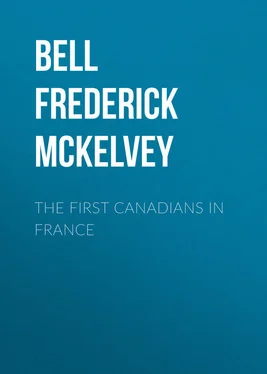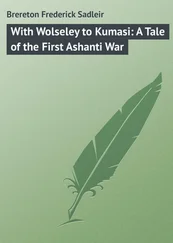Frederick Bell - The First Canadians in France
Здесь есть возможность читать онлайн «Frederick Bell - The First Canadians in France» — ознакомительный отрывок электронной книги совершенно бесплатно, а после прочтения отрывка купить полную версию. В некоторых случаях можно слушать аудио, скачать через торрент в формате fb2 и присутствует краткое содержание. Жанр: foreign_antique, foreign_prose, на английском языке. Описание произведения, (предисловие) а так же отзывы посетителей доступны на портале библиотеки ЛибКат.
- Название:The First Canadians in France
- Автор:
- Жанр:
- Год:неизвестен
- ISBN:нет данных
- Рейтинг книги:4 / 5. Голосов: 1
-
Избранное:Добавить в избранное
- Отзывы:
-
Ваша оценка:
- 80
- 1
- 2
- 3
- 4
- 5
The First Canadians in France: краткое содержание, описание и аннотация
Предлагаем к чтению аннотацию, описание, краткое содержание или предисловие (зависит от того, что написал сам автор книги «The First Canadians in France»). Если вы не нашли необходимую информацию о книге — напишите в комментариях, мы постараемся отыскать её.
The First Canadians in France — читать онлайн ознакомительный отрывок
Ниже представлен текст книги, разбитый по страницам. Система сохранения места последней прочитанной страницы, позволяет с удобством читать онлайн бесплатно книгу «The First Canadians in France», без необходимости каждый раз заново искать на чём Вы остановились. Поставьте закладку, и сможете в любой момент перейти на страницу, на которой закончили чтение.
Интервал:
Закладка:
They broke forth into the wildest cheering and shouted again and again, " Les Canadiens! Vive le Canada! " until the clamour was deafening. Men, women and children surrounded us in thousands, laughing, singing and talking, shaking the soldiers by the hand, embracing and even kissing them in the excess of their welcome.
That the boys weren't always kissed on account of their irresistible beauty may be gathered from this little conversation which took place en passant :
" Mon Dieu! " exclaimed one of the girls to her nearest neighbour, "why did you kiss that ugly face?"
"Because," was the reply, "he looked so lonely – he seemed to need it most."
They marched up the street with us, arm in arm, all who could get near enough, and threw a thousand questions at us in one unintelligible clatter of French. It was a welcome to stir the blood of the coldest, and from that moment we took France to our hearts, as she had taken us, and held her fast.
What did the landing of a mere handful of Canadians mean to France? There weren't enough of us to be of much importance, compared with the thousands of other British troops which landed daily. But the French, with their keen sense of appreciation, recognised at once that the advent of this little Canadian band had a broad significance; it meant that in her great struggle for the cause of liberty and humanity France was to be supported not only by Britain but by the far-flung elements of the Empire. It meant encouragement; it meant success!
And as they shouted " Vive le Canada " we echoed with a will, " Vive la France ." We sang, too, "God Save the King," and " La Marseillaise ." A few who knew English joined in the first, but " La Marseillaise " starting by courtesy with us, swelled in a moment into a mighty anthem which swept the city like a storm. Later, when we followed with "The Maple Leaf," a respectful silence fell upon the throng. With quick intuition they knew it was a song of home, with which they sympathised, but which they could not understand. And as the melody concluded we could hear them whispering one to another: " Quelle est cette chanson? " And we answered in our broken French, "It is a song of our native land, far, far from here."
It was my good fortune during this strange march to ride upon the side close to the curb, while Reggy, in comparative obscurity, rode opposite. Frequently, too, it was my privilege to return the greetings of the dainty French girls who lined the walk and waved their handkerchiefs high above the heads of the crowd in the road.
At last Reggy, trotting along in the shadow, could contain himself no longer. He burst out:
"Hang it all, major! Just my bally luck again; you're always closer to the girls than I."
"But not closer to their hearts, Reggy dear," I interjected soothingly.
"Small consolation, that, in the present situation," Reggy was grumbling, when he was suddenly interrupted by a pretty black-eyed girl who, running alongside his horse, caught him by the hand and forthwith begged a kiss. I believe – or, rather, I hope – Reggy blushed. I should always like to think that at that precise moment Reggy's sense of modesty came to his rescue. If it did, however, it vanished again with alarming rapidity.
"Here's an embarrassing situation," he cried dolefully.
"Very trying, indeed, to have a pretty girl demand a kiss," I laughed.
"Confound it!" he returned. "That's not the trouble; but I'm not horseman enough to lean over and get it."
There, you see, Reggy in one fell moment had destroyed all my illusions about him. Here was I worrying over his distress and presumed embarrassment, while he, hopeless young scamp that he was, showed actual regret because he couldn't fall from grace.
"I would suggest that you dismount," I answered, in a spirit of sarcasm.
For a moment I believe this insane thought obsessed him, and then his latent sense of military discipline and dignity saved him. He turned regretfully to the young lady, and pressing her hand warmly – very warmly, I thought – broke forth in schoolboy French:
" Merci, cherie! Mille fois, mille fois . Another time will have to do."
" Est-ce-que vous parlez Français, monsieur? " she demanded sweetly.
"Rather rough on your French, Reggy," I teased, "asking you, after that brilliant sortie, if you really speak the language."
Reggy appeared hurt.
"Look at you," he cried, "riding along like a bloated monarch, scooping in the obeisance of the whole kingdom, and because I command the attention – and, I trust, respect – of only one of your subjects, you're jealous. Out upon you – for shame!"
All good things come to an end at last. For half an hour we had been princes or kings, drinking in the nectar of adulation in mighty gulps. It turned our heads and made us dizzy, and this feeling of elation lasted long after we had left the crowd behind, and the faint cry of Vive les Canadiens followed us into the darker streets. We toiled slowly over the cobble stones, up the steep hill, and finally into camp.
The camp commandant came to meet us a few minutes after we arrived. He was a fine-looking specimen of British officer – tall, athletic, with iron-grey hair and keen blue eyes. He smiled as he greeted us.
"Good evening, gentlemen," he said, as the senior major approached and saluted. "Where have you all come from?"
"Originally from Canada, sir," the major replied, "but recently from Salisbury Plains."
"How interesting," he cried in a tone of delighted surprise. "I had no idea the Canadians were coming to France so soon."
"Weren't you expecting us, sir?" the major ventured.
The commandant laughed good-humouredly. We seemed to amuse him.
"Well, not exactly," he replied; "but you are quite welcome. Take those three rows of tents, draw your rations and make yourselves at home. One of these days orders will come along for you."
One of these days! Well, well! Was he actually addressing us in that careless and flippant manner, we who had just taken France by storm? Alas! we were not so important after all. For a full hour we had looked upon ourselves as the whole war, and the rest of the British army as a mere background to our glory. And now we were told that "one of these days!" It was really too bad. But still, he was kindly and courteous, and behind those smiling eyes lurked a great sympathy, I am sure, for our little band.
We looked about us and then we understood. There were miles of tents. Regiments of soldiers were marching in and regiments were marching out – the Highland "kilties" with their sporrans swaying to and fro in stirring unison. We heaved a sigh. It was all too true. We were only one small cog in the great machine!
But the senior major was elated with a strange and inexplicable emotion. After the commandant had bidden us good-night, he paced back and forth, with his hands behind his back and his head in the air. He raised his feet high as he walked, and clicked his spurs with the firmness of his tread. Something was effervescing in his mind, and soon would blow his mental cork out. What was it? He twirled his moustaches from time to time and smiled a crafty smile. At last it popped:
"Gentlemen," he said, "that's one thing which no one can ever take from me!"
"What?" we cried breathlessly.
"That I was the first officer who ever led a Canadian unit into France!"
Oh, the supreme egotism and self-love of old bachelorhood! We turned away without a word, in time to hear little Huxford's piping voice in ungrammatical query.
"Did ye had a good time to-night, Bill?"
And Bill's reply echoed the sentiments of all our hearts.
"Did I?" he cried exultantly. " Some class!"
Читать дальшеИнтервал:
Закладка:
Похожие книги на «The First Canadians in France»
Представляем Вашему вниманию похожие книги на «The First Canadians in France» списком для выбора. Мы отобрали схожую по названию и смыслу литературу в надежде предоставить читателям больше вариантов отыскать новые, интересные, ещё непрочитанные произведения.
Обсуждение, отзывы о книге «The First Canadians in France» и просто собственные мнения читателей. Оставьте ваши комментарии, напишите, что Вы думаете о произведении, его смысле или главных героях. Укажите что конкретно понравилось, а что нет, и почему Вы так считаете.












